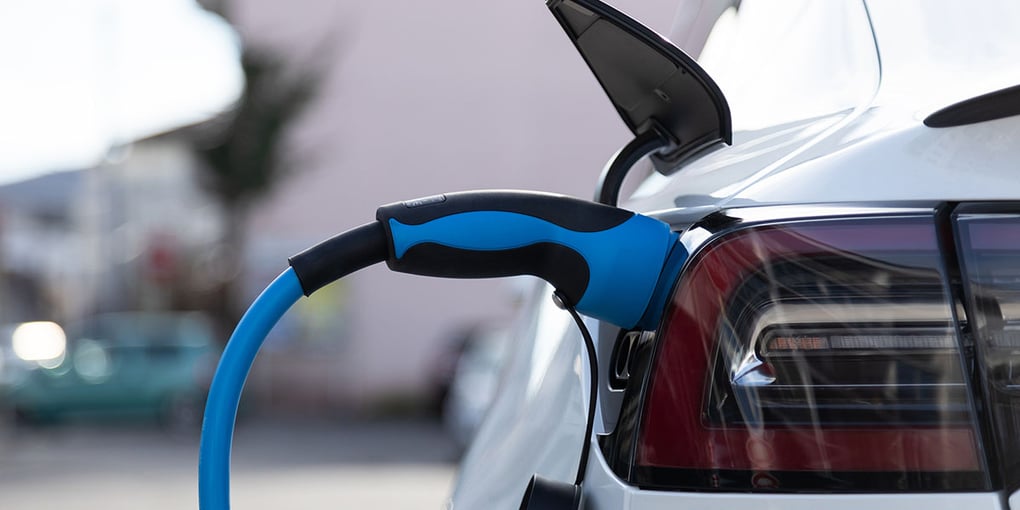Are you leaning towards getting an electric vehicle (EV)? A recent study conducted by AAA says 25% of those surveyed were likely to select a fully electric — not a hybrid — for their next vehicle purchase.
Do you like the idea of owning an EV, but you’re not sure if it’s right for you? Before picking a color, let’s go over a checklist of items to consider before you make the purchase.
Note: This checklist is meant to help those deciding on a personal EV, not fleet managers.
✅ Before Buying an EV, Consider Its Range
Living in a city versus living in a sprawling suburb requires extra thought in how much range you need daily. City life may mean shorter and fewer trips, while those living in the suburbs will have a longer commute. Don’t make range anxiety your reality — it’s better to overestimate than underestimate your range.
How to Track Your Range
You can get a good idea of the range you’ll need simply by writing down your current odometer reading at the beginning of your day. At the end of the same day, write down your odometer reading.
Subtract the end-of-the-day reading from the beginning-of-the-day reading for a general idea of how many miles you drive daily. Compare that number of miles to the EV range you’re thinking of purchasing. You’ll get a ballpark estimate of how many days you can go before charging your EV.
Want a gold star? Do this daily for a full week to account for days you may drive more or less. You’ll be able to average the amount you drive, giving you a clearer picture of what your range needs are.
A comforting fact from AAA: Calls from AAA members needing roadside assistance are the same whether they are driving a gas engine or an EV — tires and towing. AAA points out that they are rarely called to assist a member whose EV battery has been drained.
✅ Think About Where You’ll Charge an EV
There are three different levels of charging stations for an EV.
Level 1 Charging
Level 1 is a basic outlet you’d find in most garages. You can use a Level 1 to charge your EV, but do you have the time? A Level 1 charge adds about three to five miles of range to your battery per hour. A fully drained battery will take around two days to fully recharge. Cheap, yes. Also very time-consuming.
Level 2 Charging
Level 2 charging stations charge faster, and they cost you more. A Level 2 charger can take a fully drained battery up to a full charge in about 4.5 hours. You can get a Level 2 charger installed at home, the cost of which is upwards of $1,300. To find out how much it’ll cost you, you’ll need bids from licensed electricians.
Retired Goodyear Electrical Engineer Bob Oswald looked at installing a Level 2 charger in his newly built home as an investment. Oswald says, “We don’t have an EV, but since we were building a new house, it seemed like a good idea to put the infrastructure in place for a Level 2 charger while the house was being built. If we decide to sell the house, it’ll add value.”
Oswald is on to something — Realtor.com says houses situated near charging stations are 1.5% higher in value compared to surrounding areas. Country-wide, these houses are 2.6% higher in value.
If you’re not ready to install a Level 2 charger, you can get a membership to an EV Charging Network. These memberships and their apps show you where the closest charging stations are and what level of charger is available.
ChargePoint is one of the largest charging networks, with over 18,000 charging station locations. Using their app, you can find a charging station near you and see how much it’ll cost to charge your EV. To give you an idea of how much it’ll cost, a quick Google search shows in the Houston, TX, area Level 2 charging varies from free to up to 30 cents per minute of charging.
Level 3 Charging
A Level 3 charging station, also known as DC Fast Charging, can charge a drained battery in about 30 minutes. Saving time costs money, though. A Level 3 will cost you somewhere between $10 to $30. There are more than 21,000 DC Fast Charging stations in the U.S.
A word to potential Tesla owners: Tesla has a unique connector to charge its battery. You’ll either need to look specifically for a Tesla charging station or buy an adapter to use when charging at a non-Tesla charging station.
While there are three types of charging stations, there is a fourth option: bidirectional charging. Bidirectional charging is when an EV can send power to either the electrical grid (V2G) or vehicle-to-home (V2H). Yes, a very small number of EVs can power your appliances in a power outage or sell excess power to the grid.
The Ford Lightning and the Nissan Leaf are the only V2G and V2H options (at the time this blog was written). In a press conference, Ford CEO Jim Farley touted the F-150 Lightning could charge a stranded Tesla. That boast has been tested and proven true. Ford even provided some of the first F-150 Lightning customers with a Tesla adaptor so Ford owners could lend a hand to their Tesla neighbors. The F-150 Lightning’s standard plug J1772 can already charge a non-Tesla vehicle.
✅ Are You Buying or Leasing Your New EV?
One big advantage to leasing an EV is that the technology surrounding EVs is developing so fast it’s difficult to keep up. At the end of your lease, you can upgrade to the most up-to-date technology with a new EV lease. Range and charging rates are also improving quickly, so leasing an EV keeps you abreast of the latest and best systems.
Buying the EV means you’re stuck with that EV until you decide to go through the buying process again.
One item in favor of buying an EV is that you will get the full Federal Electric Vehicle Tax Credit of up to $7,500 if both you and the vehicle meet qualifications. If you lease an EV, the leasing company will get the tax credit. Pro Tip: See if the leasing company will pass that benefit on to you by applying it to the overall cost of the lease, thereby lowering your monthly payment.
Buying your EV also allows you to finance the vehicle at your choice of lending institution.
Insuring an EV, whether new, used or leased, is more costly than a regular combustion vehicle. This is because EVs generally cost more at the onset and the cost of any repairs is more expensive than a gas-powered engine. You can look at the average insurance cost for some common EV models here.
CarPro can help you find your dream EV. Click on “Buy a Car” and then use the filters to search our site. The great thing about CarPro is that the dealers are personally certified to give you a smooth, easy and fun experience when buying a car. If at the end of your journey you don’t feel you received 5-star service, the professionals at CarPro will investigate what went wrong and how they can fix it. CarPro dealers that don’t maintain a 4-star rating or above will no longer be certified by CarPro.
✅ Should I Worry About Replacing the Battery?
Federal law requires manufacturers to back a minimum of 8 years or 100,000 miles on their EV batteries. California one-ups federal law by requiring 10 years or 150,000 miles. In general, most batteries are expected to last 15 to 20 years and continue charging/discharging for 100,000 to 200,000 miles. If you're ever required to replace the battery on your own dime, you can expect to pay around $5,000 to $10,000.
✅ Ask for Answers Before You Buy an Electric Vehicle
In July, General Motors launched EV Live. EV Live is a free, digital platform that interacts with customers wanting to learn more about EVs. GM provides education and resources on range, ownership, maintenance and charging. Anyone can use the resources whether you’re buying a GM vehicle or not.
In addition to videos and articles, you can request a free live tour with an EV specialist. Depending upon availability, the EV specialist can answer questions for an individual or a group.
GM Vice President of EV Ecosystem Hoss Hassani talks about why GM started the EV Live program: “We saw a need for accessible, credible and engaging sources of information to empower consumers to adopt EVs and appreciate their many benefits. With EV Live, we’re making it easier to learn about the EV experience. Whether you're curious or skeptical, an experienced owner or brand new to EVs, the experts at EV Live are here to help.”
Is an Electric Vehicle Right for You?
Technology, software, materials and infrastructure surrounding electric vehicles is developing and upgrading at a rapid pace. Stay curious and keep learning. Becoming an EV owner shouldn’t be scary. Answer the questions on this checklist to determine whether this is the car for you.
Browse the CarPro website to find reviews on electric vehicles, and search our inventory to find the EV you’ve been dreaming of.
About CarPro
CarPro is a one-stop-shop for everything automotive. Buy a car, sell your car, and get the latest auto news and advice all on carpro.com. CarPro has built a network of vetted, certified dealers (CarPros) in large metro areas in California, Ohio, Oregon, and Texas known for providing exceptional customer service. Think of us as your personal auto dealer referral service, connecting you with trusted experts—for free. CarPro can also help you sell your car nationwide for payment on the spot. We're here to help you make informed decisions.



